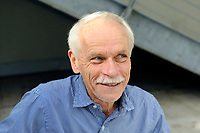Förväxla inte samhällsekonomi med hushållsekonomi Det er foruroligende, at to tidligere overvismænd, såkaldte ’topøkonomer’ Torben M. Andersen og Michael Svarer uden at ryste på hånden kan konkludere først i Jyllandsposten (20. juni, 2020) og dernæst uændret i Altinget så sent som 15. januar 2021 på følgende måde: ’Mindre brug af offentlige ressourcer i dag øger muligheden for større offentligt forbrug i fremtiden, og bidrager således til også at have et...
Read More »Zemmour, Vichy et les juifs de France
Zemmour, Vichy et les juifs de France .[embedded content]
Read More »Do RCTs really control for ‘lack of balance’?
Do RCTs really control for ‘lack of balance’? Mike Clarke, the Director of the Cochrane Centre in the UK, for example, states on the Centre’s Web site: ‘In a randomized trial, the only difference between the two groups being compared is that of most interest: the intervention under investigation’. This seems clearly to constitute a categorical assertion that by randomizing, all other factors — both known and unknown — are equalized between the experimental...
Read More »How to compute causal effects using regression (student stuff)
How to compute causal effects using regression (student stuff) .[embedded content]
Read More »A beginner’s guide to Bayesian statistics (student stuff)
A beginner’s guide to Bayesian statistics (student stuff) .[embedded content]
Read More »Paul Krugman and the power of folk economics
Paul Krugman and the power of folk economics And then there’s Paul Krugman who … has stumbled on folk economics. And I’ll give him credit, since the “folk” he refers to “needn’t be members of the working class. They can be, and often are, members of the elite: plutocrats, powerful politicians and influential pundits.” Absolutely! … But then he reverts to classic Krugman: mainstream economists get it mostly right, and all they really need is the “IS-LM...
Read More »Feltänk om statsskuld och budgetunderskott
.[embedded content] Ett av de grundläggande feltänken i dagens diskussion om statsskuld och budgetunderskott är att man inte skiljer på skuld och skuld. Även om det på makroplanet av nödvändighet är så att skulder och tillgångar balanserar varandra, så är det inte oväsentligt vem som har tillgångarna och vem som har skulderna. Länge har man varit motvillig att öka de offentliga skulderna eftersom ekonomiska kriser i mångt och mycket fortfarande uppfattas som förorsakad av för...
Read More »Desire
.[embedded content]
Read More »The Grossman-Stiglitz Paradox
In general the price system does not reveal all the information about “the true value” of the risky asset … The only way informed traders can earn a return on their activity of information gathering, is if they can use their information to take positions in the market which are “better” than the positions of uninformed traders. “Efficient Markets” theorists have claimed that “at any time prices fully reflect all available information” … If this were so then informed traders...
Read More »The Gray Ghost
[embedded content] For Tora and David — with whom, when they were just little kids, yours truly spent hours and hours watching this series back at the beginning of the 90’s. You were my heroes then. You still are.
Read More » Lars P. Syll
Lars P. Syll




